|
From the Kentish Gazette, 28 July 1857.
SALE TO-MORROW.
KENT. IMPORTANT FREEHOLD LANDED INVESTMENT, ESPECIALLY FOR TRUSTEES,
Comprising the ENTIRE ISLAND of ELMLY, Situate in the parishes of
EASTCHURCH and ELMLY, about 13 miles from Chatham and three from
Sittingbourne, containing above 2,500 acres of principally MARSH
LAND, Brickfields, and the "FERRY" PUBLIC-HOUSE, and about 10 acres
of Land in the parish of MURSTON, the whole producing a rental of
about £3,100 per annum.
MESSRS. FAREBROTHER, CLARK, & LYE are instructed by the Mortgagee,
under his power of Sale, TO SELL, AT GARRAWAY'S, ON WEDNESDAY, July
29, at Twelve, A VERY IMPORTANT FREEHOLD MANORIAL LANDED INVESTMENT,
Comprising the ENTIRE ISLAND of ELMLY, situate in the parishes of
EASTCHURCH and ELMLY, adjoining the Isle of Sheppey, about three
miles from Sittingbourne, to which the railway will shortly be
completed, and 13 from Chatham, and only half a mile from the King’s
Ferry and proposed new bridge over the Swale for railway and
passenger traffic on the branch line to Sheerness; consisting of a
substantial and new erected Farm-house, with very extensive Offices
in the best state of repair, Garden, and about 408 acres of rich
Arabic and Marsh Land, let on lease to Messrs. Lake at £600 per
annum; a capital Stock or Grazing Farm, with Bailiff’s Cottage
numerous enclosures of the most productive Marsh Land, together with
valuable saltings, containing about 1,004 acres, let to Mr. George
Wood at £1,125 per annum.
Three other Farms, containing together above 973 acres, let to
Messrs. Bloxland and Coveney at rents amounting to £1,261 per annum.
Valuable Brickfields, containing an inexhaustible supply of capital
brick earth, with cottages.
The Elmly Hills, consisting of about 50 acres of land, with landing
quay, let to Messrs. Lake at £50 per annum; plantations near the
church, and wastes in hand.
Also the public house and 10 acres of land, in the parish of Murston
the whole estate comprising an area of about TWO THOUSAND FIVE
HUNDRED ACRES, and producing about £3,100 PER ANNUM.
Particulars and plans may be had at the "Bull Inn," Sittingbourne;
"Sun," Chatham; "Bull," Rochester; of Messrs. Frere, Milford, and Cholmeley, solicitors, 6, New-square, Lincoln’s-fields; at
Garraway’s; and at the offices of Messrs. Fairbrother, Clark, and
Lye, Lancaster-place.
|
|
From the
http://lettersfromsheppey.blogspot.com Monday, 12 November
2012.
Martha Dodd - Elmley's Longest Resident?
A couple of weeks ago, a local historian, G. Turner, kindly sent
me some photographs in response to my previous blog posting re.
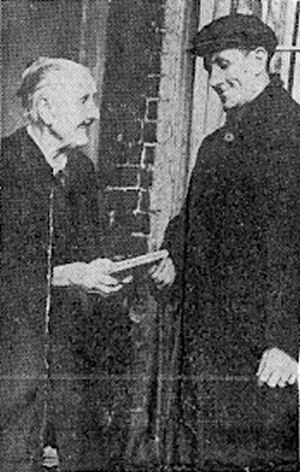 Seaview Cottages at Elmley. Among them was a copy of a newspaper
picture, from c.1938 showing who I presumed to be Mrs. Martha Dodd,
receiving post from a postman at Elmley. I knew that the Dodd family
had lived on Elmley and although they were not related to me in any
way, I was intrigued that she appeared to have lived on Elmley
continuously for at least 87 years and I decided to see what I could
find out about her. Seaview Cottages at Elmley. Among them was a copy of a newspaper
picture, from c.1938 showing who I presumed to be Mrs. Martha Dodd,
receiving post from a postman at Elmley. I knew that the Dodd family
had lived on Elmley and although they were not related to me in any
way, I was intrigued that she appeared to have lived on Elmley
continuously for at least 87 years and I decided to see what I could
find out about her.
Martha was born in a cottage on the Elmley marshes in 1851. Her
parents were William and Elizabeth Flood and she was the last and
youngest of their eight children. Her father was born across The
Swale at Lynsted and her mother at Ospringe and by the time of her
birth in 1851 her parents had been living at Elmley since 1838, with
William employed there as a shepherd.
Looking at the wide expanse of Elmley today it would be easily to
imagine that, all those years ago, Martha had been born into a
pretty bleak landscape, but that wasn't necessarily the case. Sure
the conditions in the cottages were very basic but with numerous
cottages dotted around the marshes and a row of cottages in
Kingshill farmyard itself, plus a church nearby, there was a modicum
of social life. Between 1857 and 1987 the whole of Elmley was owned
by the Oxford University Chest and the tenancy quite often changed
hands. When the tenancy of the whole of Elmley was advertised in the
Kent Gazette in 1853, two years after Martha's birth, listed
alongside the various buildings, grazing marshes, etc, was a
brickworks. These works, covering some 25 acres alongside The Swale,
included "an inexhaustible supply of brick earth, newly built
cottages, drying sheds and kilns." It seems that the brick works
began life in the late 1840's and only lasted for around ten years,
because in c.1860 a cement producing factory was built on the site.
Included in the same advertisement was the "Ferry
House" pub and Ferryman's cottage on the Murston side of
Elmley Ferry, this 10 acre site also belonged to the Elmley estate.
Anyway, despite the employment offered by this nearby industry,
Martha's father remained working as a shepherd and by 1861 the
family were found to be living at Rose Cottages on the flat marsh
north of Kingshill Farm. By this time, two of Martha's brothers were
also employed, one as a farm labourer and the other as a Cooper. A
1946 sketch of the buildings show a largish L-shaped cottage close
to a second building with cattle stalls below and rooms above.
Today, only the second building remains.
A second family of three, the Rutlands, are also shown as living
at the cottages at the same time but whether they all shared the
larger cottage or were split between the two buildings is not
indicated.
In 1868, the 17yr old Martha married 25yr old shepherd James
Dodd. He and his family were living in a cottage elsewhere on Elmley
after moving from Little Bells Farm, near Eastchurch, some years
before. That's pretty much how it was in those days, it was a pretty
solitary life and unless you was lucky, you simply married somebody
who lived close by, had children and spent a life mirroring that of
your parents before you. The harsh facts of this were obviously
clear to Martha just three years later in 1871 when she was just 20
yrs of age. Both she and James were living in an un-named cottage on
Elmley, she already had a 1yr old daughter Ann and they were sharing
the cottage with three of her husband's relatives, his 60yr old
grandmother, his 18yr old sister and a 14yr old nephew.
By 1881 the Turkey Cement Works down by The Swale were in full
flow and even employing some people from off of Sheppey - new blood
was beginning to appear on Elmley!. As a result, several short
terraces of houses had been built, also one or two larger houses and
there was even a pub-come shop, the "Globe" - a small community was
forming. Four years later in 1885, a new school was also built
alongside the church, a school mistress employed and an average
attendance of 49 children attended. In the 1881 Census Martha and James were recorded as now living in
that community, in one of the Jobs Hole Cottages, (they later became
known as Seaview Cottages), at No.4. This move very likely came
about because James had changed jobs, he was now working as a second
Wallman and it was custom in the district that regular Wallmen were
allowed the use of a cottage and a certain quantity of coals, with
their wages fixed on that basis. It was an important job because
with high tides regularly occurring in The Swale, as they still do,
upkeep of the sea walls was vital in order to prevent the marsh and
its buildings from becoming flooded. By that time as well, they were
sharing their cottage with their now five children - Harriet b.1872,
Esther b.1873, Alfred J. b.1875, Jane E. b.1877 and Alice E. b.1880.
Curiously, there was no mention of their first-born, Ann, who would
of been 11 that year, had she died? Fortunately as well, the
relatives were gone, Martha would of been glad of the room, the
cottages were always pretty cramped affairs in those days. Jumping forward to 1891, the cement works was at the busiest point
in it's short history and was employing labourers from as far away
as Birmingham. James and Martha were still living in the same
cottage and James was still employed as a Wallman. Their 19 year old
daughter Harriet was not recorded as living there however and had
probably married or was working away somewhere, whilst 16 year old
son Alfred was working as a labourer in the cement works. However
the loss of Harriet from the household hadn't resulted in anymore
room in the cottage, or any less work for Martha, for they now had
three lodgers, all bargees working out of the cements work's small
dock. Martha was now 40 years of age and presumably life wasn't getting
much easier, a husband, four children and now three lodgers all
packed into the one cottage. Its easy to speculate, despite her age,
whether Martha had yet ever been anywhere else away from Elmley. The likes of Sheerness, Minster or Eastchurch would of all involved
long walks along rough footpaths across fields and marshes, or
possibly by horse and cart. Presumably the shortest route would of
been via the Elmley Ferry, just half a mile away and a walk into
Murston or Sittingbourne. Whichever route was taken would probably
involve the best part of a day out and it would be easy not to
bother, providing enough food could be achieved from their garden
and the surrounding estate. Water was obtained from a wind pump
close to the cottages and was stored in iron bound water casks
outside the cottages. Likewise, coal was provided as part of their
employment agreement, I wonder how it got there, was it brought
there by a coalman on a horse and cart, or by other means. And
finally to add to their problems, an inventory of all the buildings
on Elmley that year noted that in respect of Seaview Cottages, "a
good deal of work was necessary...not only to cottage occupied by
Dodd but to the other three, for the labour of which the tenant is
no doubt responsible". 1901 brought about the second year of a new century and with it came
a rapid drop in Elmley's population figures. The cement works had
closed in 1900 and with the urgent need to find other work, a lot of
the community there had begun to drift away, with many ending up in
London. The population figures for Elmley around that time
demonstrate what I mean: in 1891 - 201, 1907 - 146, 1911 - 50.
Children attending the Elmley schoolhouse had also dropped, with
average attendances in 1907 of only 14 children. For Martha and James, little had changed, they were still at No.4
Seaview Cottages, although James had now reverted back to a job as
an Agricultural Labourer (farmhand) and the children had all left
home. With the girls presumably getting married and therefore
changing their surnames it has not been possible to track their
whereabouts, except the youngest. 23yr old Alice was now working as
a servant for an old lady in Dover. As for Alfred, well with the
demise of the cement works he had obviously joined the exodus to
London and in the autumn of 1900 had married a wife called Jane and
was living in Greenwich and working in the local gas works there. 1911 is the last year that census returns are currently available on
line and they once again show Martha and James still living on
Elmley and although it isn't recorded, presumably still at Seaview
Cottages. Martha was now 60 and poor old James 68 and still working
as a farm labourer there. Interestingly, that was the first census
where the householder was responsible for completing his/her own
entry. In the relevant sections James has recorded that he and
Martha had 7 children born alive, 6 were still alive in 1911 and one
had died. That leaves a slight mystery in that I have only seen six
children recorded as being born to the couple, perhaps James made a
mistake with his entry. Of the children, once again only Alfred is
traceable, still living in Greenwich, still working in the gas works
and now with a 5yr old daughter. And so, after that Martha's story goes cold, until that is, she
re-appeared in a local paper in c.1938, pictured taking her post
from the postman, who would of still come across from the mainland
via the Elmley ferry. (I have another photo of the very same postman
handing mail to a young Gransden actually at the ferry) The
newspaper caption also indicates that she was living a few miles
away from Kingshill Farm itself and so I'd be surprised if she
hadn't spent all those intervening years still at Seaview Cottages -
paperwork suggests that the cottages were still there as late as
1941. Was she living on her own when the photo was taken, I should
think so, although it has not been possible to find an actual date
of death for James. Martha's is an incredible story, how amazing it would of been to be
able to talk to her and compile all those memories into a real-life
record of how Elmley had once been. It must of been so hard for her,
well into her 80's, with the church and the schoolhouse falling into
dis-repair and nothing but the ghosts of the brickfields community
all around her. Sometime between 1938 and her death in 1942, Martha was taken away
from Elmley and removed to Farnborough Hospital in Kent where she
died in Feb. 1942. None of her current family know the reason why
she was hospitalised where she was, or what her illness was, but
after her death she was brought back to Sheppey and buried at
Queenborough Churchyard. |
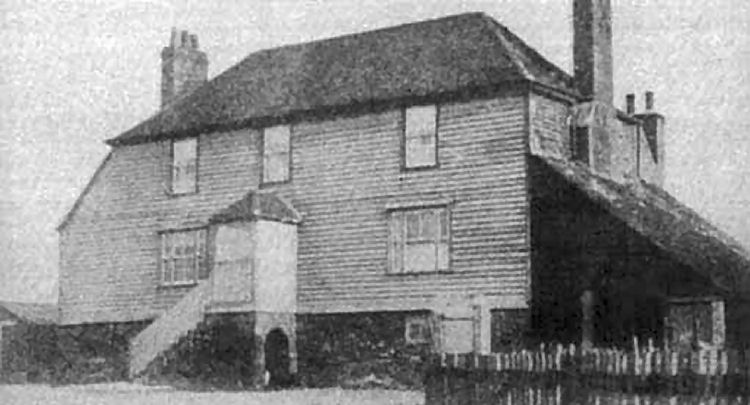
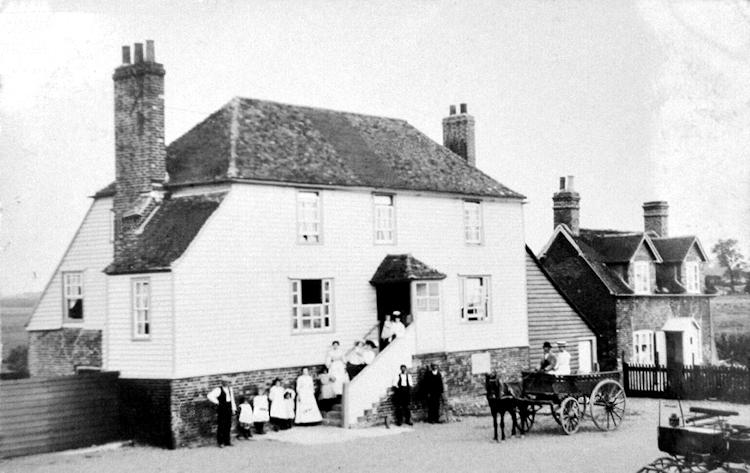
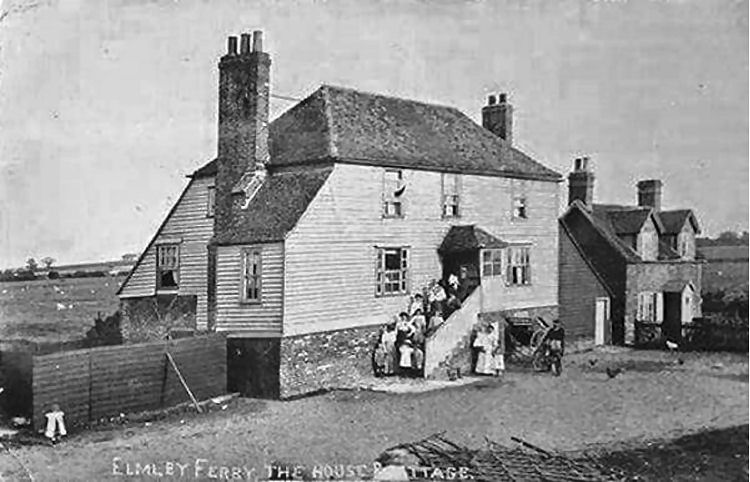
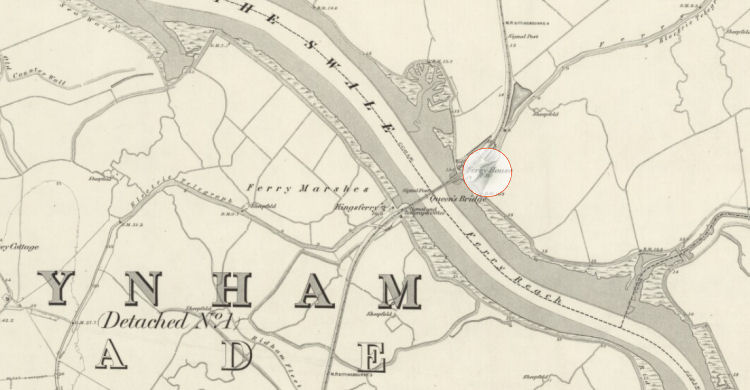
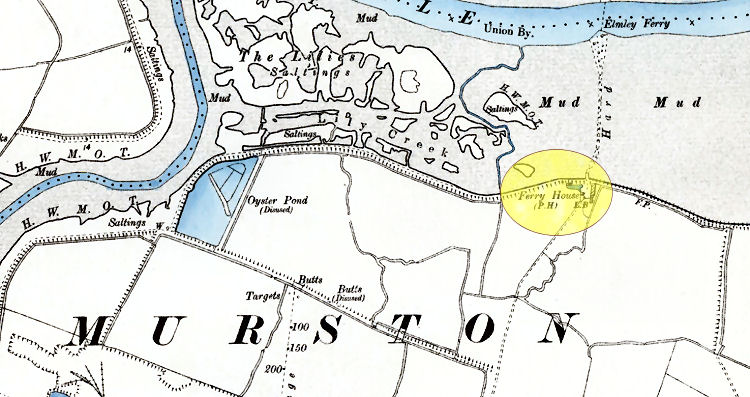
 Seaview Cottages at Elmley. Among them was a copy of a newspaper
picture, from c.1938 showing who I presumed to be Mrs. Martha Dodd,
receiving post from a postman at Elmley. I knew that the Dodd family
had lived on Elmley and although they were not related to me in any
way, I was intrigued that she appeared to have lived on Elmley
continuously for at least 87 years and I decided to see what I could
find out about her.
Seaview Cottages at Elmley. Among them was a copy of a newspaper
picture, from c.1938 showing who I presumed to be Mrs. Martha Dodd,
receiving post from a postman at Elmley. I knew that the Dodd family
had lived on Elmley and although they were not related to me in any
way, I was intrigued that she appeared to have lived on Elmley
continuously for at least 87 years and I decided to see what I could
find out about her.